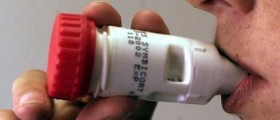
Sulfonamides are medications used to treat different bacterial infections. The most common of these drugs are sulfamethoxazole, trimethoprim-sulfamethoxazole and erythromycin-sulfisoxazole. Some other drugs can also contain sulfonamide, including: furosemide (Lasix), hydrochlorothiazide (Microzide), glyburide (Glynase, Diabeta, Micronase), glimepiride (Amaryl), celecoxib (Celebrex) or sumatriptan (Imitrex).
Sulfa drugs allergy is the condition that affects about 3% of the overall population. These people experience serious reaction as the side effect of sulfonamide medications. There are also much higher chances of developing this condition in patients with immune deficiencies, especially those suffering from AIDS, who have about 60% chances to be allergic to sulfa drugs.
Symptoms of Sulfa Drugs Allergy
Breathing difficulties, aches in the joints and muscles, blood problems and reaction of the skin and lungs are some of the symptoms present in people experiencing sulfonamide allergy.
The most common reaction to sulfonamides is the skin reaction. It can be present in the form of rash or increased sensitivity to the sunlight (also called photosensitivity). In some cases, allergy to sulfa drugs can even cause severe skin reactions such as toxic epidermal necrolysis or Stevens Johnson Syndrome (SJS). This syndrome affects the mucous membranes and the skin, and can even be a life threatening condition.
People already suffering from asthma may experience worsening of their current condition if they are also found to be allergic to sulfonamides. These medications have proven to affect the lungs, causing aggravation of asthma symptoms and also some reactions similar to pneumonia.
Patients using and being allergic to sulfa drugs may also have problems with the pains and aches in the joints and muscles. In most cases, first symptoms occur after a week or two after the beginning of the treatment with sulfonamides.
Sulfa drugs can affect the blood, provoking decrease in the number of white and red blood cells and platelets.
How to Treat This Allergy
Doctors don’t have any special tests to discover if someone is allergic to sulfonamides or not. They are able to diagnose the condition once the person experiencing any of the above symptoms reported them. After the diagnosis, your doctor will stop the sulfa drug and prescribe you something else to treat your current condition. This allergy is simply just one of the side effects associated with sulfa drugs, and patients diagnosed with it are strongly advised not to use any medications containing sulfonamides.
Sometimes, patients can be desensitized to sulfonamides. This requires careful dosage of the medication and gradual increase of the drug for a certain amount of time, so that patien's body will be able to tolerate the sulfa drug without the adverse reaction to it.

















Your thoughts on this
Loading...